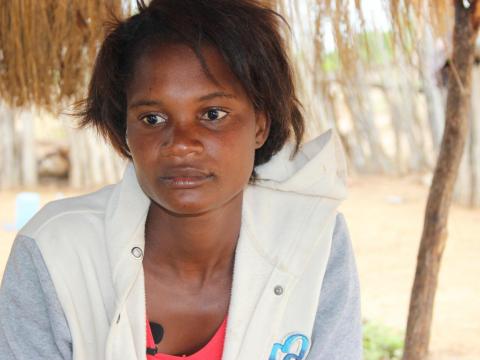Mother devastated after loosing her child to hunger in Angola

By Antonio Matimbe, World Vision Communications Officer, Angola
Angola is currently facing the most severe drought in 38 years. Failed rains have led to failed crops, severely hindering the ability of many parents to provide for their children's needs. No one feels the consequences of the drought more than Teresa Nhetafina.
“I was a mother of two," she says, explaining that her children were diagnosed with severe malnutrition and that despite her best efforts, she couldn't save them both. "My younger son died, due to hunger," she says.
From bad to worse
Not only did she lose one of her children, she was forced to send her older son, Jaime, 5, away to live with relatives in Namibia and try to save him. “It was tough for me to let him go," she says. "I stay here and I ask myself ´Why me?´. I have lost one child and I can’t [even] live with the other one because I am afraid he will die too," she says as tears roll down her face. "[This] is the most painful moment in my life. If he was here, looking at him would help me to heal my pain. But, then I realize that this is God´s plan. He is the one with power to give and take,” Teresa explains.
The root of hunger: drought
Davide Tanguenhomoene started having constant diarrhea and was coughing last February when Teresa decided to stop breastfeeding him. “I thought he was getting sick with my milk,” she explains.
Then, Teresa started providing boiled corn bran for her children. That’s all she could get, as her family failed to harvest enough food due to severe drought that affected Angola in the last cropping season.
Widespread effects of drought
She is not alone. Hundreds of thousands of families are failing to feed their children in southern Angola. The situation is currently affecting more than two million people in Angola, including 500,000 children, and even more in neighbouring countries.
With empty stores, families in Cunene were forced to cut the number of meals a day from three to two and in some cases to one. Many adults left rural areas in search of any employment in the cities.
“In ordinary years, we could have ground nuts, corn, beans, fruits, cucumbers and variety of leaves for our meals," Teresa explains. "But, it did not rain,"
Identifying and serving those in need
Without ingesting enough nutrients, Davide’s condition deteriorated. Five months later, a World Vision Health Community Agent diagnosed both her children with severe malnutrition. There were referred to hospital and received therapeutic food for quick recovery, provided by World Vision with United Nations Child´s Fund (UNICEF).
“Therapeutic food is a temporary measure for quick recovery of malnourished children," says World Vision Nutrition Coordinator, Isaias Ricardo. "After recovery, they [need to] be provided with nutritious food. Otherwise, they risk having the same problem again.”
Searching for Solutions
Teresa ventured to Namibia where she worked as a babysitter, leaving behind her two children in the care of her mother. But, it did not take so long until she received a devastating call – Davide did not resist. He had passed away.
“I was in Namibia working when I got a call from home telling me that my son had died. I was shocked. I was in Namibia for him and all I did was in vain,” she recalls.
Like Davide, about 200 children under the age of 5 have died in Cunene province alone since February 2019.
Luckily, Jaime had a different fate. He recovered from severe malnutrition. The brokenhearted mother could not heal her sorrow. Afraid of losing Jaime to hunger, she made the hardest decision of her life. “I decided to let him live with her paternal grandmother in Namibia until I manage to get food for him. If he stays here, he will die of hunger,” Teresa says.
Surrounding the yard are small cultivated plots of land ready and waiting, with her hopes, that the rain will soon return and so that she can plant and harvest crops and ultimately be reunited with her son.